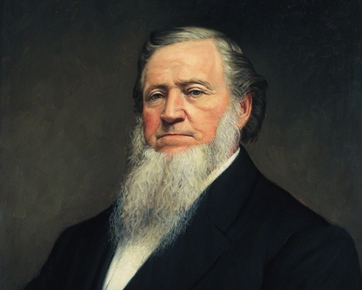Why Brigham Young was the Right Man at the Right Time
On August 8, 1944, members of the Church of Jesus Christ of Latter-day Saints gathered together to determine who should be the new prophet after the martyrdom of Joseph Smith, Jr. They listened to Sidney Rigdon, who spoke for an hour and a half. Then Brigham Young took the stand and a miraculous event occurred. Many in the congregation thought they saw Joseph’s countenance in Brigham’s face, or even heard his voice. At the end of Brigham’s speech, it was clear that the Lord had chosen the new leader of the Church (BYU Devotional “Brigham Young: The Man for the Hour Will Be Ready”).
Though besides this divine manifestation, there are many others reasons why Brigham was a good choice for a prophet at this time. Whether it was his kindness towards others, his lion-like roar for the gospel, or his amazing leadership abilities as he settled the Utah territory, we cover a few of the traits that Brigham Young had which made him the right man to lead the Church at this time.
Humility and Hard Work
Considering Brigham’s bold personality, his high calling in the Church, and the fact that he was leader for the Utah territory, people may not generally think of Brigham as a humble man considering all of the power available to him. However, a leader of the Church must have humility to listen to the voice of the Lord and allow His guidance for the Saints. This was especially the case for Brigham since he was leading a Church so new to people and that was facing many trials.
Brigham was born into very modest circumstances. As a boy, he helped his family to clear out and farm the land. He said, “In my youthful days, instead of going to school, I had to chop logs, to sow and plant, to plow in the midst of roots bare-footed, and if I had on a pair of pants that would cover me I did pretty well”
There were many times in Brigham’s life where his situation was a humbling one. When Brigham traveled to Kirtland, Ohio to join the saints there, he was recently widowed and caring for two children. He says:
When we arrived in Kirtland, if any man that ever did gather with the Saints was poorer that I was—it was because he had nothing. . . . ‘Brother Brigham, had you any shoes?’ No; not a shoe to my foot, except a pair of borrowed boots. I had no winter clothing, except a homemade coat that I had had three or four years. . . . I had traveled and preached and given away every dollar of my property.
Brigham sacrificed his worldly possessions so he could join the Saints and help forward the gospel (Brigham Young: American Moses).
As you will see throughout this article, many of the circumstances of Brigham’s life were quite poor. But they would help shape him into a prophet by teaching him not only to have humility, but to be a hard worker as well. Brigham once said that he believed “honest, reliable work, such as would endure, for those who employed me” to be “a part of my religion.” Brigham would work this way from the time he was apprenticed as a carpenter and glazier at age 16, through his calling of leading the Church (Teachings of the President of the Church: Brigham Young).

Enduring Through Trials
If there was one trait neccesary for a prophet in the early days of the Church, it was the ability to endure to the end. Think of the circumstances Brigham was entering into: Joseph had been martyred, the saints were being persecuted, and they needed to travel to an unknown territory out West. Brigham had a lot to deal with, which not only took a lot of hard work and faith, but endurance as well.
We see Brigham being prepared for his calling by earlier experiences in his life. In this case, it was tough time for Brigham. The saints had just been driven out of Missouri, which left them quite destitute. On top of that, Brigham and his family were all very ill. It was one of the worst times to leave on a mission.
But Brigham had been called to serve a mission in England, and even though he and his family were poor and ill, he was determined to go. Brigham was so sick that he would not walk very far without help. His sister begged him not to go, but “I was determined to go to England or to die trying. My firm resolve was that I would do what I was required to do in the Gospel of life and salvation, or I would die trying to do it.”
When Brigham and Heber C. Kimball, who was also very ill, started to ride away for the mission, they paused for a moment and weakly stood up in the wagon. Together, they cried out, “Hurrah, hurrah, hurrah for Israel!” to the families they were leaving behind, giving them hope.
However, Brigham’s troubles were only just beginning. While traveling through New York, Brigham tried to jump on a ferryboat and fell, dislocating his shoulder. Several of the brethren held Brigham down while Parley P. Pratt pulled on his arm until Brigham was able to guide it back into socket. Later, while on a boat to England, Brigham became very seasick. He says, “I felt as though I could not endure many such voyages. Were it not for the power of God and his tender mercy I should despair. But the Lord is my strength.”
Brigham would endure his many trials faithfully. He and the other apostles reached England, and they had great success there. They baptized over 7,000 people and printed 5,000 Books of Mormon. Because of Brigham’s ability to endure to the end, he not only brought the gospel to many people in England, but he was prepared to endure the trials he would face as a prophet (40 Ways to Look at Brigham Young ; Teachings of the President of the Church: Brigham Young).
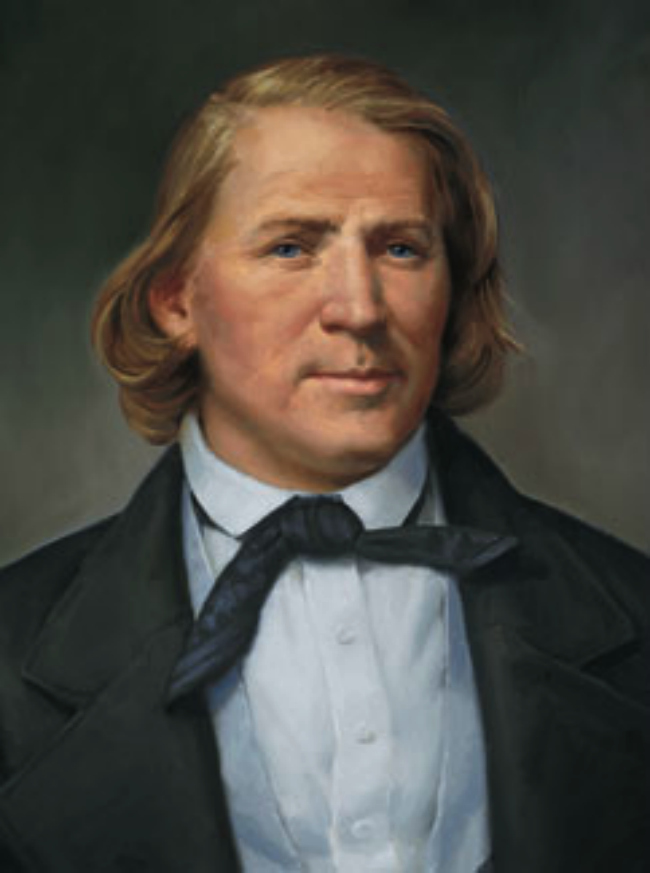
Love Towards Others
One trait that a prophet needs to have in any era is love for others. A prophet shows kindness towards people as he dedicates his life to service in the Church. Brigham is no exception, having a love for the Church as a whole down to the individual members.
Brigham’s kindness can be seen when he was traveling to England for a mission. Though he had been recently ill himself, he helped care for Heber C. Kimball, who was still very sick. While on the trip, George Albert Smith’s eyesight became temporarily impaired due to illness. Brigham guided him along, helping him select food on his plate to eat.
When Brigham guided the Saints to Utah, he not only cared for the Church as a whole, but for the individuals as well. One such case is with Lucy Groves. She had recently given birth and was still very weak. So when she tried to climb out of a moving wagon, she slipped and fell. The front wagon wheel ran over her, breaking three ribs. Lucy’s husband pulled her away, but he wasn’t fast enough and the back wheel broke her leg.
Brigham came over immediately and helped to set her leg. He blessed Lucy, saying that she would reach the Salt Lake Valley in good health. Several days later, her leg was mending very well and it looked like she would be able to walk soon. Then disaster struck. Lucy’s daughter accidently tripped over her leg and broke it again. Lucy was in so much pain that she cried out every time the oxen took a step.
Finally, Lucy begged her husband to pull the wagon over. Brigham noticed and came to see what was the matter. Lucy tearfully told Brigham to leave without them, but he told her that he would not leave any of his people alone, and he stopped the wagon train there for the night. That evening, using poster bed and the bows of the wagon, Brigham fashioned a hammock so Lucy could ride in comfort. For several days, he stayed at her side to make sure she was okay. Lucy’s grandson later wrote of Brigham saying, “With his gentle kind manner, he won the love of Lucy and her posterity forever” (Brigham Young: American Moses).
Brigham’s great kindness and love for others can also be seen in how he treated the members of his large family. Though he had many wives and children, he put forth an effort to show love towards them all. Brigham Young: American Moses quotes Zina D. H. Young, one of his wives, who said of Brigham:
No man could be more careful of women while bearing their children, thoughtful and kind as far as means could be obtained than was Brigham Young. . . . My two sons, step-sons of his, I do not remember of his ever even speaking sharp to them.
Brigham showed kindness to his children not only through words, but his actions. Whenever one of his children was ill, Brigham would dismiss a council meeting and say that “the meeting could wait, but his sick child could not” (40 Ways to Look at Brigham Young).
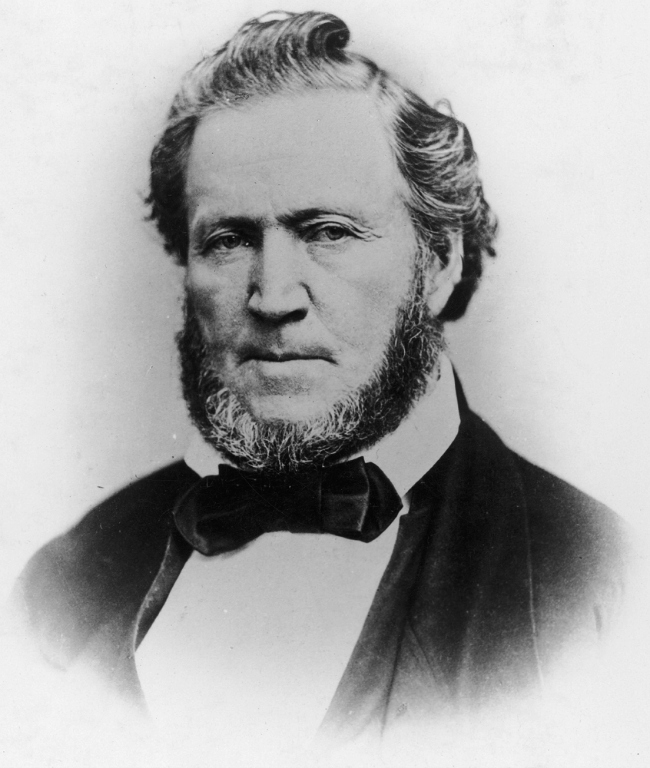
Faithfulness to the Prophet
A prophet learns the teachings of the gospel and how to run the Church from his predecessor. Brigham Young had the opportunity to learn and work with Joseph Smith Jr., the first modern-day prophet of the Church who “has done more, save Jesus only, for the salvation of men in this world, than any other man that ever lived in it” (D&C 135:3). Joseph was an amazing man, and Brigham learned much from him.
Brigham admired Joseph and was good friends with him. Brigham said, “I never did let an opportunity pass of getting with the Prophet Joseph and of hearing him speak in public or in private, so that I might draw understanding from the fountain from which he spoke . . . Such moments were more precious to me than all the wealth of the world” (40 Ways to Look at Brigham Young).
One of Brigham’s defining characteristics was his faithfulness to Joseph. The Teachings of the President of the Church: Brigham Young manual speaks of a time when Brigham found himself in a meeting of dissenters who were opposing Joseph’s authority over the Church. Brigham later said of the incident:
I rose up, and in a plain and forcible manner told them that Joseph was a Prophet, and I knew it, and that they might rail and slander him as much as they pleased, they could not destroy the appointment of the Prophet of God, they could only destroy their own authority, cut the thread that bound them to the Prophet and to God and sink themselves to @#!*%
With unwavering faith, Brigham truly kept the commandment to follow the prophet.
Another time Brigham supported the prophet happened in Kirtland, Ohio. A man wandered on the streets one night, loudly proclaiming that Joseph was a fallen prophet. Brigham met with the man and told him in his typical, bold way that “if he did not stop his noise and let the people enjoy their sleep without interruption” that he “would cow-hide him on the spot, for we had the Lord’s Prophet right here, and we did not want the Devil’s prophet yelling round the streets.”
Brigham went above and beyond the call of duty in his faithfulness to Joseph. When there were many threats against Joseph in Kirtland, Brigham slept on the floor many nights “ready to receive the mob who sought his life.” Another time, Brigham heard of rumor to assassinate Joseph. He rode out and met the coach Joseph was traveling in so he could escort him home (40 Ways to Look at Brigham Young).
In the Discourses of Brigham Young he spoke of Joseph Smith saying, “I feel like shouting Hallelujah, all the time, when I think that I ever knew Joseph Smith, the Prophet whom the Lord raised up and ordained, and to whom he gave keys and power to build up the Kingdom of God on earth and sustain it.” Brigham supported and witnessed the prophet who would lay a foundation for Brigham to one day lead the Church
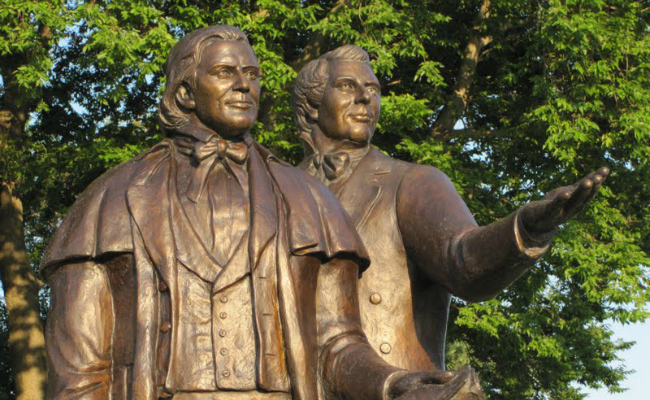
Leadership
An obvious key to being the prophet is having the ability to lead. This trait was even more important in Brigham’s case with the Church being so young, the violent persecutions against it, and settling a new territory. But if there is one trait that Brigham had, it is certainly that of a good leader.
Brigham’s leadership in the Church started when he became a captain in Zion’s camp. Though the conditions of the camp were rough, Brigham and his brother, John, tried to keep high spirits and sang songs to cheer up the other brethren. After the camp, Brigham would become one of the 12 apostles and serve a mission in the Eastern U.S. and Canada (40 Ways to Look at Brigham Young)
Brigham proved his ability to lead while in Missouri. The extermination order against the saints had been issued, and many of the leaders of the Church were either in jail or had left the gospel. Brigham Young and Heber C. Kimball were the only ones left. Together, they helped lead the Saints out of the dangers of Missouri and into Illinois (Teachings of the President of the Church: Brigham Young).
Brigham Young continued to be a powerful leader for the Church. After he was called as the second prophet for the Church after the martyrdom of Joseph Smith, he faced the daunting task of leading the Saints to the Salt Lake Valley. Yet he not only succeeded, but he also became the territorial governor for Utah, helped settle much of it, and was a factor in bringing the railroad and telegraph there (LDS.org’s article “Brigham Young: Basic Facts”).
Others noticed Brigham’s ability to lead. A frenchman, Jules Remy, said of Brigham that few men “possess in so high a degree as he does, the qualities which constitute the eminent politician and the able administrator. All who have had an opportunity of seeing him at his work, friends or enemies, are unanimous on this point.” The author Mark Twain also noticed Brigham’s power when he traveled to Utah and said that Brigham was, “the only absolute monarch in America.”
However, Brigham’s position in the Church did not make him arrogant. He believed that only one man should have complete power over a people, “Who is that man? Our Father in heaven, God, the Eternal Father.” Brigham humbly lead by the Lord’s will. He also said, “I have had some people ask me how I manage and control the people. I do it by telling them the truth and letting them do just as they had a mind to” (40 Ways to Look at Brigham Young).
At the time of his death, Brigham’s apostles spoke of the amazing leader Brigham had been for the Church. They said:
During the thirty three years that he has presided over the Church, since the martyrdom of the Prophet Joseph, his knees have never trembled, his hands have never shook; he has never faltered or quailed. However threatening the surroundings or prospects may have been, he has never been dismayed; but at those times he has exhibited such serene confidence and faith, and uttered such words of encouragement, as to comfort and sustain all the people, and to call forth their love and admiration. The Lord, however, not only blessed him with valor, but He endowed him with great wisdom. His counsels, when obeyed, have been attended with salvation, and as an organizer and administrator he has no superior. . . .
His labors the Lord has crowned with most remarkable success, his words he has honored and fulfilled, and those who have obeyed his counsel he has blessed and upheld. The time will yet come when his presidency over the Church of Jesus Christ of Latter-day Saints will be pointed to as an epoch of wonderful events
Brigham’s powerful leadership would influence the Church and it’s members for years to come (Teachings of the President of the Church: Brigham Young).
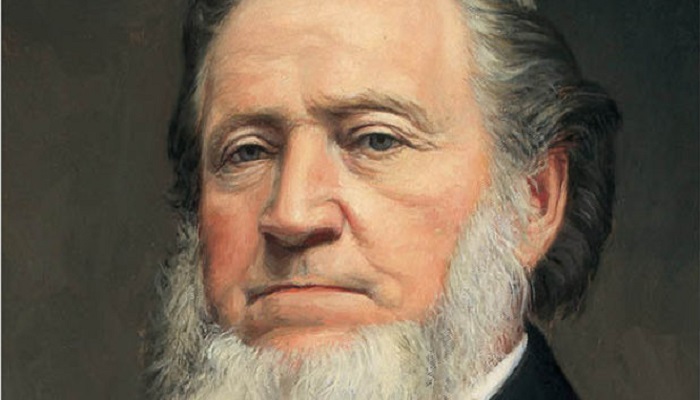
Faith in the Gospel
Faith is neccesary for all prophets, but especially for Brigham. He needed to have faith in a new religion, faith that the Church could survive through persecutions, faith that he could lead the Church after it’s first prophet was martyred, and faith that he could lead the Saints into a desert valley to make a life for themselves. If there is one thing Brigham had, it was faith.
However, faith came slowly for Brigham Young. He was introduced to the Church by some of his siblings. They were eager to accept the gospel, but Brigham wasn’t ready to jump headlong into things. “Hold on,” he said. “Wait a little while; what is the doctrine of the book, and of the revelations the Lord has given? Let me apply my heart to them.” For two years, Brigham studied the Book of Mormon to determine whether it was true or not (Teachings of the President of the Church: Brigham Young).
It wasn’t until after Brigham heard the testimony of “a man without eloquence” that he accepted the gospel in his life. Brigham and his family were listening to some missionaries, still unsure whether they should join the Church, when one of the missionaries bore his testimony. Brigham says:
When I saw a man without eloquence or talents for public speaking, who could only say, “I know by the power of the Holy Ghost that the Book of Mormon is true, and that Joseph Smith is a Prophet of the Lord,” the Holy Ghost proceeded from that individual, illuminated my understanding, and light, glory, and immortality were before me. I was encircled by them, filled with them, and I knew for myself the testimony was true.
This man’s simple testimony was a catalyst to Brigham’s conversion to the Church and development of faith (BYU Fireside “Brigham Young, Prophet of God”).
Once Brigham’s joined the Church, his faith seemed to withstand all trials and remain unwavering. For example, after the trials of Zion’s Camp and the lack of success, it seemed like the camp was all for nothing. But when someone asked Brigham what they had gained by the journey, he responded, “Just what we went for; but I would not exchange the knowledge I have received this season for the whole of Geauga County; for property and mines of wealth are not to be compared to the worth of knowledge.”
Later in Missouri, Brigham displayed overpowering faith in the face of danger. The extermination order had been set out and Brigham heard it read by John B. Clark, who after reading the order said that he thought Mormons were, “the best and most orderly people in this state,” but should renounce their religion or leave. Brigham’s response? He said:
Renounce my religion? No, sir, . . . it is my all, all I have on this earth. . . . No, sir, I do not renounce my religion. I am looking beyond; my hope is beyond this vale of tears, and beyond the present life. I have another life to live, and it is eternal.
An order had just been read to exterminate those of the Church, but Brigham had stood up for his faith no matter the circumstance (Brigham Young: American Moses).
Brigham had to continuously have faith, especially when the Saints first entered the Salt Lake Valley. Though Brigham announced, “this is the place,” what the Saints saw was a desert, a harsh and infertile territory. In fact, Jim Bridger, a mountain man who lived nearby, told Brigham that they wouldn’t be able to plant anything in the desert ground. He even bet Brigham a thousand dollars for a bushel of corn harvested from the land (40 Ways to Look at Brigham Young).
The situation was not ideal. But Brigham had faith in the Lord and told the Saints, “We have been kicked out of the frying-pan into the fire, out of the fire into the middle of the floor, and here we are and here we will stay. God . . . will temper the elements for the good of His Saints; he will rebuke the frost, and the sterility of the s0il, and the land shall become fruitful.” All that Brigham promised came to pass and the Saints prospered in the valley (Brigham Young: American Moses).
Brigham’s faith carried him through his trials. In the Discourse of Brigham Young, he bears his testimony saying:
My testimony is positive. . . . I know that the sun shines, I know that I exist and have a being, and I testify that there is a God, and that Jesus Christ lives, and that he is the Savior of the world. Have you been to heaven and learned to the contrary? I know that Joseph Smith was a Prophet of God, and that he had many revelations. Who can disprove this testimony? Any one may dispute it, but there is no one in the world who can disprove it. I have had many revelations; I have seen and heard for myself, and know these things are true, and nobody on earth can disprove them. . . . Men talk about what has been accomplished under my direction, and attribute it to my wisdom and ability; but it is all by the power of God, and by intelligence received from him. I say to the whole world, receive the truth, no matter who presents it to you.
Conclusion: the Lion of the Lord
Critics of the Church of Jesus Christ of Latter-day Saints like to point out the faults of our leaders. They believe that these weaknesses prove that they are false prophets and the Church isn’t true. While it is true that the prophets and apostles sometimes make mistakes, we must remember that they are human and imperfect.
And with every weakness, there is a strength, a strength that is the reason for why God chose this person to be a leader in the Church. Such is the case of Brigham Young. Some people thought he was overconfident or arrogant. But Brigham never claimed to be perfect. He said that “There are weaknesses manifested in men that I am bound to forgive, I am right there myself. I am liable to mistakes. . . . But I am where I can see the light” (40 Ways to Look at Brigham Young).
Brigham did had weaknesses, but he was God’s chosen prophet and truly the right man for this time. One of his nicknames was the “Lion of the Lord,” and for good reason. He had the heart, courage, and roar of a lion in God’s work. He lead the Church after the martyrdom, stood true against persecution, and guided the Saints to the Salt Lake Valley. He ruled in faith with the guidance of the Lord, and the Saints listened to him for they knew he was the prophet.



